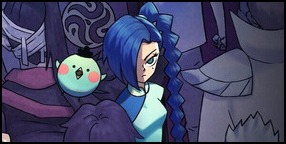New
What did you think of this episode?
DO NOT discuss the source material beyond this episode. If you want to discuss future events or theories, please use separate threads.
DO NOT ask where to watch/download this episode or give links to copyrighted, non-fair use material.
DO NOT troll/bait/harass/abuse other users for liking or disliking the series/characters.
DO read the Anime Discussion Rules and Site & Forum Guidelines.
DO NOT ask where to watch/download this episode or give links to copyrighted, non-fair use material.
DO NOT troll/bait/harass/abuse other users for liking or disliking the series/characters.
DO read the Anime Discussion Rules and Site & Forum Guidelines.
Jan 17, 2021 7:13 PM
#51
| Fun episode, I already really like where this anime is going, OP was really good too. I like the new characters introduced, and if I didn’t read the discussion board of episode 1 I definitely would have been fooled by Akira lol, but even then I don’t mind a trap character. |
Jan 17, 2021 8:18 PM
#52
| Akira speaking his femmeboy truth, tell 'em kiddo. His social media dramatics were also a little amusing, ngl. I can appreciate that the (one-sided) attrition between Shiki and Kabane was handled pretty quickly. Idk how much of their joint unknown parents background is going to actually be fleshed out here, but it was interesting to see the contrast in their perspectives on it. |
Jan 17, 2021 8:31 PM
#53
| I felt more meh about this episode than the last one. Nothing new stands out about this anime to me. The MC is OP but has yet to fully realize their powers. Traps. Tsundere future best friend. Stong mentor. Even the “learning to feel emotions” subplot from anime like Violet Evergarden. It’s still pretty watchable, but I was kinda disappointed compared to the previous episode. |
Jan 17, 2021 8:49 PM
#54
| Great episode, I am really enjoying the show. And as I noticed last episode, Akira is indeed a boy lmao. I find him to be really adorable though. Of course this premise isn't exactly unique, but as long as the execution is good it will be a great show. Also, the OP is a banger. Looking forward to the next episode. |
 |
Jan 17, 2021 9:51 PM
#55
Emsuny said: You know being a manga reader, I was hype for this adaptation but like,,,i don't know if its the directing or budget but the pacing and directing ig is just awkward and makes the interesting story kind of well, boring. I know it's too early still, but this feels like another tokyo ghoul type beat where its a good story but gets a shit anime :/ I'm gonna keep watching tho, i just wanted to know if anyone else is getting this feeling too^^ Except they change the placement of story so that Kabane can develop chemistry earlier with the other 2 kids, as well as showcasing spider boy's ability earlier on. Ofc is not super huge budget production like Jump series (Jujutsu/ Demon Slayer) or AoT level of production, but for a niche serie like this, the production is actually pretty solid. Is not like your everyday trash isekai type of production. |
Jan 18, 2021 12:41 AM
#56
| MAN! this is a SOLID 2nd episode! Thumbs-up! 5/5. |
 |
Jan 18, 2021 1:26 AM
#57
| That OP by Ono Daisuke is so addictive, he's also voicing one character, I wonder wonder when they'll show up. Murase Ayumu flexing his voice changing skills again 👌🏽 That pizza moment of Kabane and Shiki was cute XD Those insects were so disgusting... But how these insects were triggered from guilty feeling kinda reminded me of Kai Byoui Ramune. I wonder if Kabane will be able to meet his parents in the end. I hope there's more unexpected twists. |
Jan 18, 2021 2:30 AM
#58
Emsuny said: You know being a manga reader, I was hype for this adaptation but like,,,i don't know if its the directing or budget but the pacing and directing ig is just awkward and makes the interesting story kind of well, boring. I know it's too early still, but this feels like another tokyo ghoul type beat where its a good story but gets a shit anime :/ I'm gonna keep watching tho, i just wanted to know if anyone else is getting this feeling too^^ To be honest, I feel like the story in manga wasn't really as engaging at the beginning, it's just when you read it and not watch it, the pacing feels faster. Let's wait for an actual arc to appear so we can see how it will look like then. |
Jan 18, 2021 3:05 AM
#59
phantomfandom said: While I'm glad that Kabane is really strong, I'm sad that he's very inhuman. I'd love him to be able to feel pain and pleasure... Lol. Kinda controversial and masochistic don’t you thnnk |
Jan 18, 2021 4:04 AM
#60
| This has a plot that's similar to most superpower shounen manga, but what is it that makes the emotional impact here stronger? I can't properly figure it out. Shiki failing to be a bully was oddly wholesome. Seriously though, how can you stay mad at someone who's never had pizza! As a guy who's been called a pretty girl by a lot of people, I felt a connection to Akira. lol The case they had to solve didn't feel like just one more shounen problem. It affected the protagonist in such a subtle and unexaggerated way that I cared about him more. Just like the previous episode, the foreshadowing was done quite well. We see Kabane unhurt by Shiki's web. So, it didn't feel like deus ex machina when he was also unhurt by the bugs later. Um, I think I kind of ship Kabane and Shiki. . . Very lightly. lol Hope this anime stays good or gets even better! |
Jan 18, 2021 4:13 AM
#61
| The insect family plot wasn't that good. hope they do better. |
Jan 18, 2021 7:36 AM
#62
| Oh shit, here we go again. This anime really looks dropworthy, but it's the second season in a row that in convinces me otherwise. Direction an animation are competent, writing is suprisingly solid and character interaction in this episode was just awesome, Kabane's response to Shiki gave me some chilling Gakkougurashi vibes, Kabane's simple way of thinking is just so similar to Yuki... I wouldn't say it's the biggest surprise of the season because there is an egg just screaming to get a 10/10 from it's first chapter, but Kemono Jihen really overdid my expectations |
| Akkarin! Hai! |
Jan 18, 2021 7:53 AM
#63
| damnn this anime so goooddd !! im hooked by ost ending so catchy !!! |
Jan 18, 2021 8:16 AM
#64
| The critters did not bug Kabane because he was a demon |
Jan 18, 2021 9:11 AM
#65
| Eww, bugs :x Another solid episode, not a big fan of the Opening tho (which isn't that important to be fair). I'm glad Shiki got friendlier within one episode and at least isn't a complete edgy-rival-trope. Still excited to see where this is going :) |
There's no possible way you can steal my heart    I want to drown in this sweet Melancholy |
Jan 18, 2021 10:32 AM
#66
| Good episode. I liked the opening song. The pizza scene was so nice. |
Jan 18, 2021 11:20 AM
#67
| Ewww, that made my skin crawl, especially when all the bugs were crawling in Kabane's eyes. It's kinda sad that the reason he didn't react to them is because he's suppressed his emotions for so long, but it looks like maybe his trauma could become his strength. I already love Shiki - he's such a tsundere and I'm sure he and Kabane are gonna have a cute friendship. Akira is so adorable! I was so shocked; I knew Ayumu Murase has a high voice but he genuinely sounds like a girl as Akira! |
 |
Jan 18, 2021 1:59 PM
#68
Jan 18, 2021 3:16 PM
#69
| I really like all the characters so far. |
Jan 18, 2021 4:18 PM
#70
| Pretty cool episode, but I have a question, if Kabane hasn't blood because he's a hanyo, then Shiki doesn't have it too right? So he also doesn't feel pain or has blood in his veins and could also had taken care of the bugs? I was just wondering if there's a difference between Kabane and Shiki's situation. |
Jan 18, 2021 4:52 PM
#71
PinEru said: Nah he doesn't have blood cause he's part immortal demonPretty cool episode, but I have a question, if Kabane hasn't blood because he's a hanyo, then Shiki doesn't have it too right? So he also doesn't feel pain or has blood in his veins and could also had taken care of the bugs? I was just wondering if there's a difference between Kabane and Shiki's situation. |
Jan 18, 2021 5:14 PM
#72
| the insect scene was tense, but where did these insects come from? I didn't get it right. |
Jan 18, 2021 6:57 PM
#73
| It looks like the anime is gonna keep up the quality from the first episode which is really nice. I forgot how unsettling the bug chapter was though, eugh. Though looking back at the manga, they seem to be either rearranging and/or cutting things out cuz Shiki and Akira weren't introduced until the next chapter and a lot of the beginning of the episode happened in that chapter. Either way it works honestly, I don't really mind it since it still makes sense to anime-onlys. I honestly didn't even notice until I went back to the manga to compare after I finished the ep. Yuuki_Otakuu said: the insect scene was tense, but where did these insects come from? I didn't get it right. The bugs were attracted by the guilt that the boy felt after stealing the shoes. Since they're supernatural, they were able to "appear" out of nowhere. |
Jan 18, 2021 8:58 PM
#74
Jan 19, 2021 4:31 AM
#75
| I'm really liking the vibe of this show. It's good so far, but I gotta feeling it might become one of my favorites soon. |
 |
Jan 19, 2021 8:16 AM
#76
PinEru said: Pretty cool episode, but I have a question, if Kabane hasn't blood because he's a hanyo, then Shiki doesn't have it too right? So he also doesn't feel pain or has blood in his veins and could also had taken care of the bugs? I was just wondering if there's a difference between Kabane and Shiki's situation. Kabane doesn't had blood because he is a half-ghoul and half-human. It's his ghoul part that make him doesn't has blood. Shiki is half spider kemono and half human, so I think he still be like normal human. |
Jan 19, 2021 8:18 AM
#77
Yuuki_Otakuu said: the insect scene was tense, but where did these insects come from? I didn't get it right. the insects kemono came from sense of guilt. Because the kid brother stole the pair of shoes for their mother sake and his brother scold him, then the insects kemono started to came out from his body. |
Jan 19, 2021 3:14 PM
#78
| BEST ANIME I'm sold I love this, It needs to be more popular. |
Jan 19, 2021 8:05 PM
#79
| Damn, never expect Akira to be a boy. That design surely deceived me so much. Its not just that, his va actually a male. I thought the va was a female. Lmao, what a twist. I don't ever want to say about Akira long first name, tho, since he himself don't bother with it, yet. Whatever with that! Okay, the boy and the another boy introduced themself, and looks like Shiki had a half Kemono blood, like the immortal one. Arachne was Shiki's mother? Interesting, and he liked pizza much, thats good. But what about Akira? Still no clue at this episode and i don't wanna get spoiled by myself about that trap, so i just wanna wait myself patiently to the next episode. Shiki attitude kinda annoying in this episode. His harsh personality toward Kabane looked very irritating. But, i feel like he just uncomfortable with the same age boy like Kabane around him, especially after he knew his Hanyou background. Kid complexity much, eh? That's not good. But, i like Akira scaredy cat and girly act in these episode. Its silly, yet, funny to be seen. I might be feeling, he deceived me again with those feared. But, oh well! Still no clue whats happened there, actually. At the end, Kabane aggreed to looking for his parents, especially with what happened in this episode. Which mean, he aggreed fully to help those spiritual detective office for solving as much as possible Kemono involvement, away from human prejudice. Also, whats the deal with those woman behind the phone call? Lets see the next! |
 Hide and seek is the best offline games on this fatamorgana-called-world-thing. Please comment nicely. I am newbie here. I'm level  on mal-badges. View my badges on mal-badges. View my badges  |
Jan 20, 2021 8:50 AM
#80
| OP is Pretty Okay to me, not bad however not good too. This episode we introduced to Shiki and Akira. Shinji is a pretty anger but still kind character, that at first disturbed with Kabane because almost same kemono type nevertheless at the end Shinji accept Kabane as partner. Meanwhile, Akira is Trap that I think at first was a girl just like anybody else But he still kinda beautiful though. She He was pretty tomboy and loks like kinda scaredy but We still don't know what he ability, I looking forward to whatever he ability he have. Guilty Feeling that cause Insect devour Victim Brother and Mother then added some officer was unique, I want to know why reason behind Insect (Or maybe all Supernatural Creature) can coming because some Negative Feeling that happen to people?. Hope Future Episode can be explain more deep behind it. Good Thing Kabane right now have a reason to join Inugami Supernatural Investigation Team, Hope Kabane and Shiki can meet their Parents. I want to know what make Kabane was unordinary Kemono and who is that girl that talking to Inugami?. |
 |
Jan 20, 2021 12:04 PM
#81
transphinx said: Trap and tsundere boy; that's fine by me. I wonder which type of kemono Akira is. Maybe a fox or something animal youkai like that. Whoops next episode is going to be "Foxes", so I'm probably right on the spot about that! nah dude,he is yuki-otoko,,,,a rare male version of yuki-onna |
Jan 21, 2021 6:01 PM
#82
Jan 21, 2021 9:01 PM
#83
| The case they handle is weird.. monster got attract to things that stolen? Hmmm.. I thought Shiki will be another Bakugo lol he seems nice too.. just a tsundere kid :D I don't understand Akira, he wants compliment or not? he's pretty though, and Ayumu as VA? perfect! :D |
erenmeiiJan 21, 2021 9:04 PM
| Proverbs 4:23 Above all else, guard your heart, for everything you do flows from it. |
Jan 23, 2021 6:49 PM
#84
EckhartPilgrim said: Little Bakugou isn't as awful as how I think he would be, but he can still be quite annoying sometimes. It's nice to have a spider boy instead of the usual spider woman from Japanese folklore, though. Episode morality : stealing is bad, even if you're poor. There would be a lot of things to say about it, honestly. Eh, I'd say that's a touch of base as far as the moral of the episode. I'ts more so about integrity, what I mean is, the bugs attacked because the guilt. The guilt existed not because he stole, but because he stole and regretted it. The moral was not to not be a thief regardless of circumstance, because the theft he committed was a sacrifice of part of his integrity, that sacrifice turned to guilt, and thus the bugs attacked. More accurately, the moral of the story is, do not betray yourself in an attempt to satisfy others, for doing so will only bring despair to yourself and them. |
| Poyo. |
Jan 24, 2021 4:11 AM
#85
| Really needed this ❣️ . Feeling the slice of life taste. The heartwarming feeling . When he said "I won't let that fire extinguish" . It felt warm. 😁 |
Jan 24, 2021 8:50 AM
#86
MrSpenfo said: EckhartPilgrim said: Little Bakugou isn't as awful as how I think he would be, but he can still be quite annoying sometimes. It's nice to have a spider boy instead of the usual spider woman from Japanese folklore, though. Episode morality : stealing is bad, even if you're poor. There would be a lot of things to say about it, honestly. Eh, I'd say that's a touch of base as far as the moral of the episode. I'ts more so about integrity, what I mean is, the bugs attacked because the guilt. The guilt existed not because he stole, but because he stole and regretted it. The moral was not to not be a thief regardless of circumstance, because the theft he committed was a sacrifice of part of his integrity, that sacrifice turned to guilt, and thus the bugs attacked. More accurately, the moral of the story is, do not betray yourself in an attempt to satisfy others, for doing so will only bring despair to yourself and them. The little brother wasn't even conscious that what he did was stealing, so he didn't sacrifice any part of his integrity. Actuality, there would have been no problem if the big brother didn't shove morals in his little brother's face the way he did. He didn't even let the boy explain how he got the shoes and went straight to make him feel guilty, because... stealing is bad, you know. Just think about it: if the big brother didn't say anything, or explained to his little brother that what he did was stealing while keeping the shoes because their mother still need them, or even just explained to the kid then went to give the shoes back, the whole situation wouldn't even have happened and no moral would have come out of it. But it was important for the author that something came out of this story, and this something is that you mustn't steal, whatever the circumstances. At the end of the episode everything is ok, morals are safe and the mom can go back to walk with her worn shoes. Well, all that to say that I didn't like the explanation behind the whole situation at all and particularly the way the author handled it, with morals and stuff. However, I'm aware that this is a shounen show made for 10-15 year-old boys and that you can't just tell kids stealing is ok. As an adult, I however think that context is crucial to understand and judge an individual's action, and I don't share the author's morals concerning this specific story. |
EckhartPilgrimJan 24, 2021 8:53 AM
Jan 24, 2021 2:43 PM
#87
EckhartPilgrim said: MrSpenfo said: EckhartPilgrim said: Little Bakugou isn't as awful as how I think he would be, but he can still be quite annoying sometimes. It's nice to have a spider boy instead of the usual spider woman from Japanese folklore, though. Episode morality : stealing is bad, even if you're poor. There would be a lot of things to say about it, honestly. Eh, I'd say that's a touch of base as far as the moral of the episode. I'ts more so about integrity, what I mean is, the bugs attacked because the guilt. The guilt existed not because he stole, but because he stole and regretted it. The moral was not to not be a thief regardless of circumstance, because the theft he committed was a sacrifice of part of his integrity, that sacrifice turned to guilt, and thus the bugs attacked. More accurately, the moral of the story is, do not betray yourself in an attempt to satisfy others, for doing so will only bring despair to yourself and them. The little brother wasn't even conscious that what he did was stealing, so he didn't sacrifice any part of his integrity. Actuality, there would have been no problem if the big brother didn't shove morals in his little brother's face the way he did. He didn't even let the boy explain how he got the shoes and went straight to make him feel guilty, because... stealing is bad, you know. Just think about it: if the big brother didn't say anything, or explained to his little brother that what he did was stealing while keeping the shoes because their mother still need them, or even just explained to the kid then went to give the shoes back, the whole situation wouldn't even have happened and no moral would have come out of it. But it was important for the author that something came out of this story, and this something is that you mustn't steal, whatever the circumstances. At the end of the episode everything is ok, morals are safe and the mom can go back to walk with her worn shoes. Well, all that to say that I didn't like the explanation behind the whole situation at all and particularly the way the author handled it, with morals and stuff. However, I'm aware that this is a shounen show made for 10-15 year-old boys and that you can't just tell kids stealing is ok. As an adult, I however think that context is crucial to understand and judge an individual's action, and I don't share the author's morals concerning this specific story. I disagree, it doesn't matter if someone else pushes their morals upon you, that's not the birth place of guilt, sure, it can be the trigger that makes you realize your guilt, but that's not where guilt is born. If you don't see anything wrong with your actions, then someone saying that your actions were wrong is just going to lead to a disagreement. On the other hand, if someone points out the fact that you did something wrong, and then you agree, guilt is born out of the fact that you did something that you wish you hadn't. No matter what the cause for the realization, if you realize that you did something that is wrong within your reasoning of what is right/wrong, then that will cause guilt. If you're a sociopath that doesn't see things as right or wrong, it doesn't matter if someone tells you, "what you did was wrong", you won't feel guilt. If you have a sense of what is right/wrong, but disregard it to attempt to make someone else feel happy even though it is morally wrong, and then your misdeed is recognized, you will then realize how your misdeed outweighed the "good" thing you were trying to accomplish, and thus, feel guilty. His guilt is ultimately created because, he agrees with his eldest brother that he did something morally wrong. Just because you have the reasoning at the time of "I'm going to steal in order to give my hard-working mother a new pair of shoes", that doesn't mean you won't later come to the conclusion that "my mother wouldn't want me to steal, even if it was for her benefit". On the other hand, if he grew up in a family that stole to survive, then this event wouldn't have been anything, but this is a family with integrity regardless of their poor stature, and the boy, sacrificed that integrity in hopes of doing something "nice" only to realize that he he had sacrificed integrity not only on the behalf of his family, but on his behalf as well. It doesn't matter whether or not someone led him to the conclusion that what he did was wrong or not, what matters is that he agreed with the sentiment, and felt guilt. Think of it in terms of, "you can lead a horse to water, but you can't make it drink", or in this case, "you can lead a boy to the fallacy in his ways, but you can't make him feel guilt". |
| Poyo. |
Jan 24, 2021 4:59 PM
#88
Ventus_S said: Emsuny said: You know being a manga reader, I was hype for this adaptation but like,,,i don't know if its the directing or budget but the pacing and directing ig is just awkward and makes the interesting story kind of well, boring. I know it's too early still, but this feels like another tokyo ghoul type beat where its a good story but gets a shit anime :/ I'm gonna keep watching tho, i just wanted to know if anyone else is getting this feeling too^^ Except they change the placement of story so that Kabane can develop chemistry earlier with the other 2 kids, as well as showcasing spider boy's ability earlier on. Ofc is not super huge budget production like Jump series (Jujutsu/ Demon Slayer) or AoT level of production, but for a niche serie like this, the production is actually pretty solid. Is not like your everyday trash isekai type of production. Was the scene where he rises the bug-ball-thing up in the air better explained in manga? In anime he literally raised it up, some light appeared, the item he held was hidden by a camera angle. Very confusing. |
Jan 24, 2021 6:59 PM
#89
Lylaaz said: Ventus_S said: Emsuny said: You know being a manga reader, I was hype for this adaptation but like,,,i don't know if its the directing or budget but the pacing and directing ig is just awkward and makes the interesting story kind of well, boring. I know it's too early still, but this feels like another tokyo ghoul type beat where its a good story but gets a shit anime :/ I'm gonna keep watching tho, i just wanted to know if anyone else is getting this feeling too^^ Except they change the placement of story so that Kabane can develop chemistry earlier with the other 2 kids, as well as showcasing spider boy's ability earlier on. Ofc is not super huge budget production like Jump series (Jujutsu/ Demon Slayer) or AoT level of production, but for a niche serie like this, the production is actually pretty solid. Is not like your everyday trash isekai type of production. Was the scene where he rises the bug-ball-thing up in the air better explained in manga? In anime he literally raised it up, some light appeared, the item he held was hidden by a camera angle. Very confusing. I think is most likely related to Japanese mythology. I'm not sure the source but it's probably related to some ritual regarding to certain yokai's habit and how people handle it, and the author is just using that mythology. |
Jan 25, 2021 11:05 PM
#90
| Nice , best , good terbaik di indonesia masuk trending youtube terus |
Jan 27, 2021 6:52 AM
#91
Ventus_S said: Lylaaz said: Ventus_S said: Emsuny said: You know being a manga reader, I was hype for this adaptation but like,,,i don't know if its the directing or budget but the pacing and directing ig is just awkward and makes the interesting story kind of well, boring. I know it's too early still, but this feels like another tokyo ghoul type beat where its a good story but gets a shit anime :/ I'm gonna keep watching tho, i just wanted to know if anyone else is getting this feeling too^^ Except they change the placement of story so that Kabane can develop chemistry earlier with the other 2 kids, as well as showcasing spider boy's ability earlier on. Ofc is not super huge budget production like Jump series (Jujutsu/ Demon Slayer) or AoT level of production, but for a niche serie like this, the production is actually pretty solid. Is not like your everyday trash isekai type of production. Was the scene where he rises the bug-ball-thing up in the air better explained in manga? In anime he literally raised it up, some light appeared, the item he held was hidden by a camera angle. Very confusing. I think is most likely related to Japanese mythology. I'm not sure the source but it's probably related to some ritual regarding to certain yokai's habit and how people handle it, and the author is just using that mythology. Okay, so hiding the thing from the viewer is related to mythology? Erm.. Okay.. |
Feb 10, 2021 7:36 PM
#92
| Good first case. We can see what Kabane is capable of. Hanyo species seem cool. Also there is a mysterious woman. |
Feb 13, 2021 8:05 AM
#93
| I've watched 7000 episodes of anime in my life up till now but I am still not able to distinguish a trap from a female. I'm disgusted at myself |
Feb 16, 2021 10:38 AM
#94
| Those bugs...damn those bugs. Shiki does remind me a bit of Bakugou now that I think about it. This series is really impressing me, I might have to check out the manga soon. |
| Pandora Hearts is the best manga ever made and deserves an anime reboot |
Apr 3, 2021 12:52 PM
#95
| Akira is a boy? WTF? lol cause hes so girly he should cut hes hair if he doesn't want to be mistaken for a girl :D |
Apr 8, 2021 3:24 AM
#96
Jun 7, 2021 11:54 PM
#97
Oct 11, 2021 1:36 AM
#98
| Kabane has become a kemonoist now. Yahoo. Being an immortal demon will come in handy for any future job. Inugami, in this regard, has hit the jackpot. What information will Inugami's research/digging into Kabane bring forth? A lot to look forward to. Those sanshichu bugs were kinda creepy. Enough to make one's skin crawl. Eww. Kabane faced it with no fear and pain to find the source - a pair of stolen shoes. The kid meant right, but his guilt-ridden mind could have cost both him and his mothers life. I assume he'll learn from this experience. Kabane made up his mind for Inugami to find his parents - his family. Slowly, but surely Kabane will develop, and maybe, just maybe, he'll regain his human emotions. |
Oct 21, 2021 12:21 AM
#99
| Tsundere child was here. The case are done very simply. Thought Akari was a girl, but well it doesn't matter he is still cute. Worthy opponent of Hideyoshi. |
Mar 3, 2022 11:14 AM
#100
| Very entertaining, with these first two episodes it seems the chore of the story has been about the weight that is placed of kids without acknowledging how this could affect them, with the awful upbringing Kabana had and this episode having the older brother guilt-tripping his younger brother not understanding he was just trying to something nice and it's not like he hurted anyone but it seemed like they kept the shoes? Good for the mom. The kids have been a surprise how they interacted despite just being three famous archetypes found in other Shounen series, the quiet "emotionless", the jerk and the girly one but there's a big potential from the three to be quite great characters with Kabane showing clearly that he's able to feel some form of empathy and with how honest he seems like he's eager to learn especially now that he found his light (awwww). Shiki attempt of being a jerk to Kabane was adorable, he only wants to share some time with someone that might paid attention to him. When it comes to Akira, I was expecting some awful joke about his girly appearance but thankfully I didn't happen (yet, probably) and he basically is the most outgoing out of the three when it comes to showing emotions, it was pretty obvious he was a boy, though, since the previous episode Inugami say he lived in a place full of men and it's not like his outfit would be impossible for a men to wear and there is nothing beyond the long hair that would make you thing "Is that a girl?". Hoping things don't go downhill too fast. |
SafrichhMar 3, 2022 11:27 AM
More topics from this board
Poll: » Kemono Jihen Episode 4 Discussion ( 1 2 )Stark700 - Jan 31, 2021 |
61 |
by callmethebigG
»»
Oct 10, 10:13 PM |
|
Poll: » Kemono Jihen Episode 11 Discussion ( 1 2 )Stark700 - Mar 21, 2021 |
85 |
by Remlz_77
»»
Sep 15, 4:35 AM |
|
Poll: » Kemono Jihen Episode 12 Discussion ( 1 2 3 )KANLen09 - Mar 28, 2021 |
111 |
by Novatoemanime
»»
Aug 31, 8:30 AM |
|
Poll: » Kemono Jihen Episode 6 Discussion ( 1 2 )Stark700 - Feb 14, 2021 |
65 |
by RGreatDanton
»»
Jun 19, 7:52 PM |
|
Poll: » Kemono Jihen Episode 9 Discussion ( 1 2 )KANLen09 - Mar 7, 2021 |
97 |
by The_Black_B3ast
»»
May 17, 1:19 AM |














